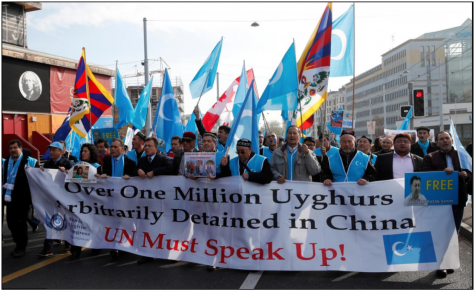The Unspoken Genocide in China
December 21, 2020

According to the U.N. Human Rights Council, there is currently a genocide against the Uighur Muslim population in China (VOA); a large group of ethnic Turkic people of Muslim religion, who reside in the North Western Xinjiang region of China. Tensions between the Uighur Muslims and the Chinese government have been ongoing since 1931, with the start of the Kumul rebellion. Since then, there have been many other factors between the Uighur Muslims and the Chinese; Tensions between Uighurs, state police, and Han Chinese are caused by the large state-sponsored migration of Han Chinese from the 1950s to the 1970s, government policies encouraging Chinese cultural unity and punishing certain expressions of Uyghur culture, and harsh responses to separatism (the combining of Xinjiang to communist China). Although there are several complex reasons for the ethnic tension, many will say that it all comes down to two underlying causes: economic and cultural (HRC).
The Chinese government has done many actions to suppress the Uighur Muslims in China. Major development projects have brought prosperity to the big cities of Xinjiang, drawing young Han Chinese from eastern provinces who are technically skilled. The best jobs are said to be granted to the Han Chinese and most do well economically, something that has fuelled Uighur resentment. Activists say the Chinese state has progressively curtailed Uighur economic and cultural practices. There are reports of extreme constraints on Islam, with fewer mosques and tight regulation over religious schools. In a 2013 study released by the rights group Amnesty International, authorities criminalized “what they called ‘illegal religious’ and ‘separatist’ practices ‘and clamped down on’ peaceful expressions of cultural identity.” In 2014, during Ramadan, many Xinjiang government departments prohibited fasting, and this was not the only time that China had restricted fasting in Xinjiang. Fighting back, violence broke out: there were street protests in the 90s and in 2008 during the run-up to the Beijing Olympics. However things got worse, for in 2009, about 200 people were killed, the majority of them Han Chinese, in the riot in the regional capital, Urumqi. This was the most intense riot that would breakout in China for the protest against their suppression. Between the years 2012-2014, 186 more people were killed due to aggression and rioting (BBC). Now the Chinese feel the need to fight back harder.
Under the administration of CCP General Secretary Xi Jinping, “re-education” camps were founded and led by CCP Committee Secretary Chen Quanguo in 2014. Such camps are evidently run outside the legal system; many Uyghurs were reportedly detained without trial and no charges were levied against them. Over the past three years, in the sprawling western province of Xinjiang, China’s Communist dictatorship has waged a campaign of cultural genocide. It has confined to detention centers more than one million ethnic Uighurs and Kazakhs and tried to eliminate their devotion to Islam. Detainees were forced to eat pork, drink alcohol and memorize Chinese songs; women have been sterilized and children were forcibly separated from their parents and sent to boarding schools. One survivor stated that people in the camps were subjected to medical experiments, beaten, and forced to watch gang rapes. To track the rest of the population, an Orwellian electronic surveillance system has been developed, using technologies such as facial recognition (Washington Post). Why is this not talked about more? Why are people still not hearing about the atrocities happening to the Uighur Muslims in China? The Chinese government, under Xi Jinping, tries to downplay the concentration camps, stating that they are vocational and training centers, purely trying to teach citizens job skills. The Chinese government claims that these camps justify the persecution in Xinjiang, as an effort to crack down on terrorism and extremism arising from the Uighur separatist movement (VOX). There is no plausible way the Chinese government can justify their ghastly actions against the Uighur Muslims.
Wehn asked about whether the Genocide should be spoken about more today, student at Ramapo, Angela Delano responds: “I first heard about the ongoing genocide when reading CNN news. I’ve heard about what occurs in the camps and how the government has been treating the Uyghur people. I think genocide should definitely be more spoken about today; even in our own education we rarely learn any genocides outside of Europe. It is atrocious that these events happen and I believe it is our duty to, at the very least, educate ourselves on them. The worst possible thing we could do is turn a blind eye to the horrors in the world, and as a society we have partially done so in favor of the more big ticket news headlines. Selective attention and activism is not beneficial when it diminishes the importance of other equally significant issues”. There must be more media and reporting on this historical horror. What needs to be done are humanitarian-driven actions. The UN must investigate the genocide further, go to the Xinjiang region, and pull together enough evidence worthy of a case that can help save the Uighur Muslims of China.





